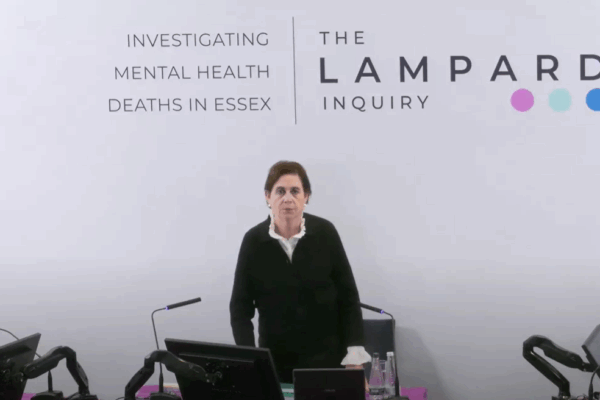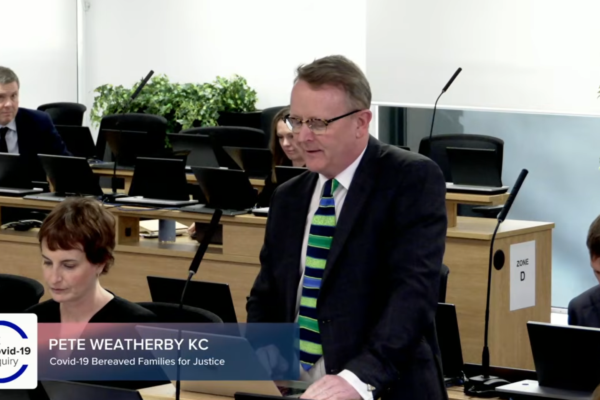Ministry of Housing’s draft guidance on Awaab’s Law an “important and long-overdue step towards protecting tenants”
3 July 2025

Two-year-old Awaab Ishak (pictured) died in 2020 due to prolonged exposure to mould in his home. Credit: Family Handout.
On 25 June 2025, the UK Government’s Ministry of Housing published draft guidance for social landlords on Awaab’s Law, which will oblige social landlords to address all emergency, damp and mould hazards that present a significant risk of harm to tenants within a specified timeframe.
Awaab’s Law, which will come into force from 27 October 2025, comes more than four years after the tragic death of two-year-old Awaab Ishak in Rochdale, Greater Manchester, who died in 2020 due to “prolonged exposure” to mould in his home, a coroner concluded.
Awaab’s family and NHS staff repeatedly reported the issue to the social housing provider, Rochdale Boroughwide Housing, but the problem remained unresolved.
Nine days after Awaab’s inquest, then-Housing Secretary Michael Gove visited Rochdale and promised to introduce Awaab’s Law. It became an Act of Parliament in July 2023, then subject to a public consultation.
Garden Court North’s Christian Weaver represented Awaab’s family during the inquest, instructed by Kelly Darlington from Farleys, and during the subsequent petition for Awaab’s Law launched by Shelter and the Manchester Evening News.
“We welcome the Government’s publication of the guidance for Awaab’s Law as an important and long-overdue step towards protecting tenants from serious hazards in their homes”, Christian said. “The guidance offers much-needed clarity for social landlords, and it is positive to see the Government delivering on this commitment.”
Earlier today (2 July 2025), the Government opened the consultation on the new Decent Homes Standard, following criticism in the Coroner’s report on Awaab’s death regarding the inadequate provisions to tackle the issue of damp and mould.
The new Decent Homes Standard will set a minimum standard that all rented homes must meet, enforced through the Regulator of Social Housing, and provide a clear route to the courts when a home contains significant hazards.
What does Awaab’s Law include?
Officially known as the Hazards in Social Housing (Prescribed Requirements) (England) Regulations 2025, Awaab’s Law will require social landlords to investigate potential hazards within ten working days of being notified.
This law will have widespread ramifications for the four million people who live in social housing in England, approximately 17% of the population.
Residents must receive a written summary of the investigation’s findings within three working days of it concluding, including hazard details, next steps and repair timelines.
If a significant risk to health or safety is identified, repairs must begin within five working days of the written summary being issued.
If the property cannot be made safe within these suitable timeframes, social landlords must offer to arrange suitable alternative accommodation for the affected tenant.

Should a landlord fail to comply, tenants are encouraged to contact the Housing Ombudsman or Social Housing Regulator. A court can order any landlord in breach of the regulations to do the repairs.
“We hope social landlords are not simply waiting for the legal duty to come into force in October, but are already taking steps to implement the systems and cultural changes Awaab’s Law requires”, Christian said. “Acting now will not only ensure a smoother transition but, far more importantly, help prevent further avoidable harm in the months ahead.”
Widening Awaab’s Law for private renters
Once Awaab’s Law comes into force in October, the next key step will be to extend its remit to protect private tenants.
In 2024, then-Shadow Housing Secretary Angela Rayner promised to eventually extend Awaab’s Law to private as well as social landlords.
“Since Awaab’s tragic death, Christian and I have experienced several deaths involving damp and mould in the private rental sector”, Kelly said. “This highlights the widespread problem that exists across the UK rental landscape. Reform is long overdue. The Labour Government’s commitment to extending Awaab’s Law to ensure private tenants are protected is welcomed.”
“The Government’s commitment to the private rental sector is essential – hazards like damp and mould do not disappear simply because someone lives in private accommodation”, Christian added. “The Government must ensure that both social and private landlords are properly supported. This cannot become a reform that looks good on paper but, in practice, makes it harder for well-meaning landlords to meet their legal duties. For the law to bring about real change, landlords must be equipped to deliver on it.”
Additional media
Manchester Evening News – Landlords told to get ready for Awaab’s Law as government sets out exact details of new regulations
GOV UK – Awaab’s Law: Draft guidance for social landlords
The Guardian – Awaab Ishak’s death shed light on a social housing scandal. Now we have a brief chance to fix it
Manchester Evening News – The five things about to change if you are renting a home
For further information, please contact Alex Blair, Communications Manager at Garden Court North Chambers: ablair@gcnchambers.co.uk





